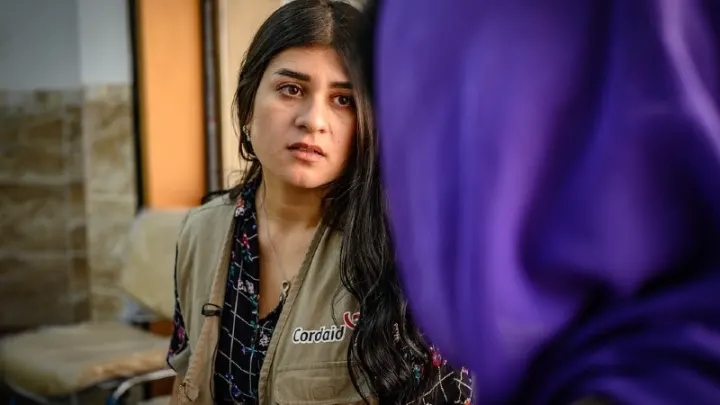They say time heals all wounds. It doesn’t. In most cases, without proper care and a supportive environment, mental wounds only worsen with time. But with adequate psychosocial support, people can start to regain resilience and perspective, giving them strength to rebuild their society. It is high time that psychosocial well-being of people and communities affected by conflict gets the international attention it deserves.
In 2018, Sonita Khalil, a trained biologist, started as a social worker in a village in the Kurdish region of Iraq, a couple of hours’ drive from her hometown, Sinjar. Together with the entire Yazidi population, she had been driven out of Sinjar by Islamic State group fighters in 2014. Four years later, knowing what forcibly displaced women and girls had gone through, knowing about the horrors and the grief, she wanted to help them carry the weight no shoulders should bear.
Khalil was trained in Seje, near Duhok, in the basics of social work and started working in a primary health center staffed and equipped by Dutch NGO Cordaid, the Catholic Organization for Relief and Development Aid, two years before. Displaced families and host community members found their way to the center, not only revealing alarming physical conditions but also severe levels of anxiety and other trauma-related disorders.
To address their acute psychosocial needs, Khalil and other newly recruited and trained social workers teamed up with the only available psychiatrist — who lived and worked a couple of hours away by car and could only come once a fortnight. Finding personnel to address mental health needs in the Sinjar area proved exceedingly hard. Like in many other parts of the world, mental health care services are still shrouded in stigma and prejudice, underrated, and understaffed.
Every single one of these mental caregivers is a hero. They give their all and work with whatever resources at hand. But the truth is that the mental health system in which they work, without expectation of recognition, has gaps as big as bomb craters.
To start, the crucial middle part of the mental health pyramid — psychosocial counseling and psychotherapy — is utterly lacking. Psychiatrists who offer specialized care and social workers who respond to primary health care needs and provide general support are filling the gaps as much as they can. But the problem is structural. Proper therapy can help prevent people from falling into a deep depression or from committing suicide. Filling the gaps out of necessity can’t.
They say time heals all wounds. It doesn’t. In most cases, without proper care and a supportive environment, mental wounds only worsen with time.
Then there’s the critical lack of mental health caregivers, coupled with the daunting scale of mental health needs. Finally, there’s the lack of time and the backlog of care. As the years go on, the suffering of displaced and traumatized people increases. Sleeping and eating disorders, anxiety, and depression add to the stress of living in poverty — conditions that have become more pronounced due to COVID-19. Traumas accumulate. With time, treatment becomes more urgent and more difficult.
But we are making progress. In the past few years, mental health and psychosocial support, or MHPSS, as part of humanitarian efforts have finally been put high on the international agenda. Indeed, important agreements on MHPSS as part of any humanitarian response were reached in 2019 with the Mind the Mind Now Conference and its Amsterdam Conference Declaration, as well as the resolution on MHPSS for people affected by emergencies, which was adopted at the 33rd International Conference of the Red Cross and Red Crescent.
And yet we do not structurally recognize the importance of MHPSS in efforts to help conflict-affected countries overcome their past. We do not systematically integrate it in national and international efforts to build and sustain peace. We should. MHPSS is crucial for individuals, families, communities, and decision-makers to be able to recover, rebuild, resume livelihoods, and foster reconciliation.
International support to communities affected by protracted crises or efforts to rebuild and sustain peace must recognize the importance of addressing psychosocial dynamics and mental needs from the very start. Without this, it remains extremely difficult to get the time, the budget, and, most importantly, the commitment of policymakers to effectively meet these mental and psychosocial needs.
Let’s build on what we have. Let’s invest in psychiatrists who speak the language of their patients, invest in full education for social workers, counselors, and therapists, in their self-preservation and protection. Let’s make sure deeply traumatized women, children, and men need not travel an entire day and queue for hours once or twice every month to see a psychiatrist. Let’s make sure mental health needs are properly mapped, allowing caregivers, health authorities, and donor agencies the ability to plan ahead and act more effectively.
Let’s catch up on painfully lost time. Let’s allow mental health care systems to develop into the broader and multilayered pyramid of health and social care they need to be, as well as gender-sensitive and adapted to the cultural, religious, and political sensitivities that come with conflict and post-conflict situations.
Let ‘s unlock the powerful contribution MHPSS can make in releasing people’s potential to recover and to rebuild the social fabric needed in their communities.
This opionion piece was first on devex.com





